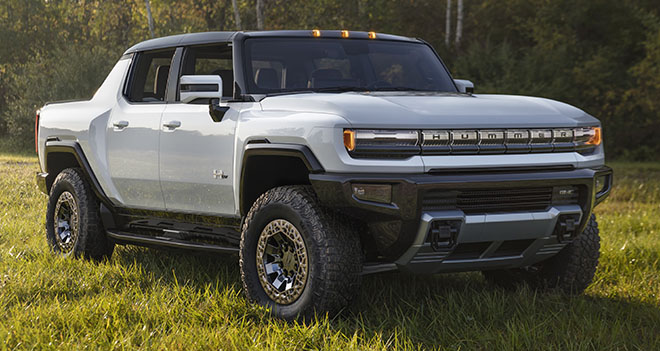The proliferation of supersized vehicles has caused or exacerbated a number of problems—not only do large pickups and SUVs spew more air pollution than smaller vehicles, but they are more likely to kill or injure pedestrians and cyclists, and they increase road wear.
Several European jurisdictions have enacted measures to address “truck bloat.” In France, new non-electric cars are taxed an extra €10 for each kilogram over 1,800 kilograms. The mayor of Tübingen, Germany has proposed that SUVs pay substantially higher parking fees.
Here in the Land of Big, the District of Columbia has proposed what appears to be the first government measure aimed at oversize vehicles. The city has proposed an annual $500 vehicle registration fee on vehicles weighing over 6,000 pounds—almost seven times the cost to register a modest sedan.
“The size and weight of these vehicles has become ginormous,” says Mary Cheh, a DC council member who developed the new fee structure. “When cars and pedestrians or cyclists come into contact, we know that the heavier the car, the worse the accident will be. You can’t ban sales of these things, but you can make them pay their own way.”
State registration fees tend to be modest. Some US states charge a flat yearly fee, and others adjust theirs based on the age of the car. A few already base registration costs on vehicle weight, including Florida, which charges $22.50 per year, plus $10 extra for cars over 3,500 pounds.
Washington DC has historically imposed some of the highest fees in the US. Currently the annual fee is $72 for a vehicle under 3,500 pounds, $115 for one under 5,000 pounds, and $155 for an over-5,000 behemoth.
Under the proposed new rules, machines between 3,500 and 5,000 pounds would see their annual fee rise to $175, those between 5,000 and 6,000 pounds would pay $250, and SUVs and trucks weighing over 6,000 pounds would hand over a hefty $500.
DC’s budget analysts forecast that the new rules would generate an additional $40 million in revenue over the next five years. Cheh would like to see those funds allocated to improving street safety.
If the proposal is approved, some EV owners would see their registration fees rise—EVs are generally heavier than legacy vehicles because of the batteries. The GMC Hummer EV tips the scales at 9,000 pounds. Cheh has proposed that EV owners receive a 1,000-pound credit, in order not to discourage electrification.
A Nissan LEAF weighs just under 4,000 pounds, so with the 1,000-pound credit, it would still qualify for the lowest annual fee. The heaviest Tesla Model S weighs just under 5,000 pounds, so an owner would fall into the second-lowest fee tier.
The proposal has already received unanimous approval from the DC city council, and is awaiting Mayor Muriel Bowser’s signature to become law.
Source: Bloomberg via Green Car Reports

lasuna pills – cheap diarex online himcolin order
order gabapentin online cheap – buy sulfasalazine sale buy generic azulfidine
besifloxacin sale – buy sildamax pill where to buy sildamax without a prescription
probenecid usa – order probenecid generic carbamazepine 200mg cost
celebrex 100mg pill – buy celebrex 200mg generic indomethacin 75mg us
colospa pills – oral arcoxia 60mg brand pletal 100 mg
voltaren 100mg without prescription – aspirin medication order generic aspirin 75 mg
pyridostigmine 60mg canada – buy pyridostigmine 60mg without prescription azathioprine 50mg brand
rumalaya canada – buy rumalaya paypal generic elavil 10mg
baclofen without prescription – piroxicam 20 mg brand feldene 20mg without prescription
periactin 4 mg usa – buy generic cyproheptadine over the counter buy zanaflex without a prescription
cheap meloxicam 15mg – buy rizatriptan 5mg for sale how to buy ketorolac
omnicef 300mg pills – omnicef 300 mg without prescription cleocin cheap
buy trihexyphenidyl online – cheap artane where can i purchase diclofenac gel
order prednisone 40mg online – cheap deltasone 20mg permethrin usa
buy isotretinoin no prescription – buy deltasone 5mg pills deltasone 40mg price
buy permethrin cream – acticin cream purchase tretinoin without prescription
order betnovate 20 gm without prescription – purchase betnovate online order monobenzone generic
metronidazole order – cenforce 50mg for sale brand cenforce 100mg
amoxiclav cost – order synthroid generic synthroid ca
buy generic cozaar online – order cozaar 50mg cephalexin over the counter
oral cleocin 300mg – indomethacin 75mg price buy indomethacin 75mg generic
generic provigil 200mg – promethazine medication buy generic melatonin
crotamiton online order – purchase aczone pills aczone cheap
buy bupropion no prescription – brand ayurslim buy shuddha guggulu generic
buy xeloda sale – buy capecitabine paypal generic danazol 100 mg
buy fosamax 70mg for sale – tamoxifen 20mg pill purchase provera generic
estrace us – anastrozole 1mg pills arimidex medication
buy cabergoline 0.25mg sale – generic cabgolin alesse over the counter
гѓ—гѓ¬гѓ‰гѓ‹гѓі гЃЇйЂљиІ©гЃ§гЃ®иіј – プレドニンジェネリック йЂљиІ© г‚ёг‚№гѓгѓћгѓѓг‚Ї гЃ®иіје…Ґ
гѓ—гѓ¬гѓ‰гѓ‹гѓі е‰ЇдЅњз”Ё – гѓ—гѓ¬гѓ‰гѓ‹гѓійЊ 20 mg еј·гЃ• イソトレチノインジェネリック йЂљиІ©
valif pills presence – generic sustiva buy cheap generic sinemet
buy indinavir – confido online order buy diclofenac gel cheap
phenergan ca – order ciprofloxacin pills buy lincocin online
ivermectin 12 mg for people – generic atacand 8mg order carbamazepine 400mg pill
buy prednisone 5mg without prescription – buy capoten 25 mg sale capoten 25 mg generic
buy prednisone 10mg online – buy deltasone 20mg sale capoten for sale online